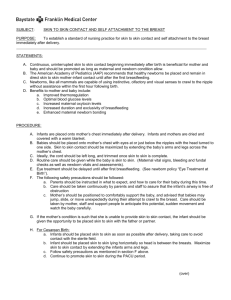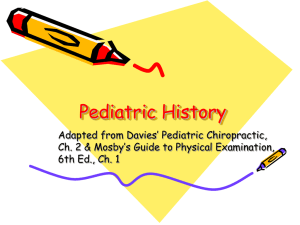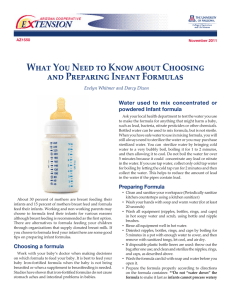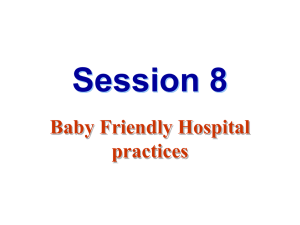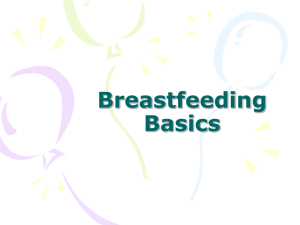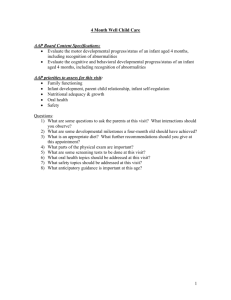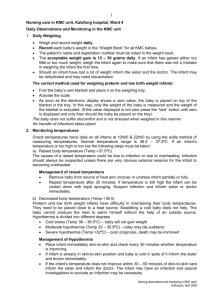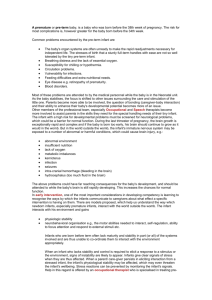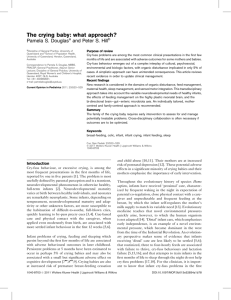Newborn questions - New Day Pediatrics
advertisement
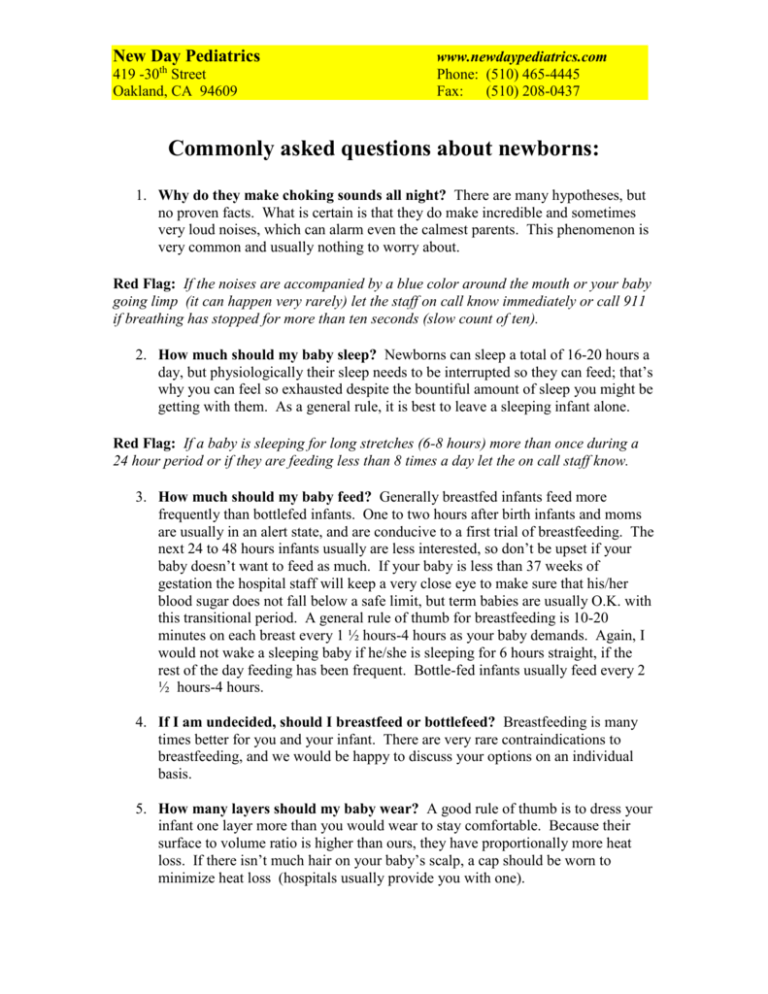
New Day Pediatrics 419 -30th Street Oakland, CA 94609 www.newdaypediatrics.com Phone: (510) 465-4445 Fax: (510) 208-0437 Commonly asked questions about newborns: 1. Why do they make choking sounds all night? There are many hypotheses, but no proven facts. What is certain is that they do make incredible and sometimes very loud noises, which can alarm even the calmest parents. This phenomenon is very common and usually nothing to worry about. Red Flag: If the noises are accompanied by a blue color around the mouth or your baby going limp (it can happen very rarely) let the staff on call know immediately or call 911 if breathing has stopped for more than ten seconds (slow count of ten). 2. How much should my baby sleep? Newborns can sleep a total of 16-20 hours a day, but physiologically their sleep needs to be interrupted so they can feed; that’s why you can feel so exhausted despite the bountiful amount of sleep you might be getting with them. As a general rule, it is best to leave a sleeping infant alone. Red Flag: If a baby is sleeping for long stretches (6-8 hours) more than once during a 24 hour period or if they are feeding less than 8 times a day let the on call staff know. 3. How much should my baby feed? Generally breastfed infants feed more frequently than bottlefed infants. One to two hours after birth infants and moms are usually in an alert state, and are conducive to a first trial of breastfeeding. The next 24 to 48 hours infants usually are less interested, so don’t be upset if your baby doesn’t want to feed as much. If your baby is less than 37 weeks of gestation the hospital staff will keep a very close eye to make sure that his/her blood sugar does not fall below a safe limit, but term babies are usually O.K. with this transitional period. A general rule of thumb for breastfeeding is 10-20 minutes on each breast every 1 ½ hours-4 hours as your baby demands. Again, I would not wake a sleeping baby if he/she is sleeping for 6 hours straight, if the rest of the day feeding has been frequent. Bottle-fed infants usually feed every 2 ½ hours-4 hours. 4. If I am undecided, should I breastfeed or bottlefeed? Breastfeeding is many times better for you and your infant. There are very rare contraindications to breastfeeding, and we would be happy to discuss your options on an individual basis. 5. How many layers should my baby wear? A good rule of thumb is to dress your infant one layer more than you would wear to stay comfortable. Because their surface to volume ratio is higher than ours, they have proportionally more heat loss. If there isn’t much hair on your baby’s scalp, a cap should be worn to minimize heat loss (hospitals usually provide you with one). New Day Pediatrics 419 -30th Street Oakland, CA 94609 www.newdaypediatrics.com Phone: (510) 465-4445 Fax: (510) 208-0437 6. What should I do with a crying baby? After birth, infants tend to cry at an increasing rate with peak crying occurring about 6-8 weeks of age. Experts hypothesize that this phenomenon may help with bonding, energy release or lung development. Interestingly, in cultures where babies are wrapped around an adult during the day peak crying is less. If your baby is well-fed, clean (no dirty diaper), comfortable temperature-wise and does not have a fever you can try talking to him/her slowly while holding him/her in front of you and establishing eye to eye contact. Gentle rocking, music and a car ride have been recommended by others. It is also invaluable to have a helper close by with whom you can take turns doing the above. Infants should never be shaken, because it can cause irreversible brain damage and death. Also, an anxious holder can make an infant cry more. So it would be O.K. and sometimes even recommended to put a crying child down in his/her crib, close the door and time on the clock five minutes before going back to him/her, while getting a chance to relax. Many times, your baby will be smiling or calm after you return to him/her. 7. What to do with colic? Colic is a more extreme case of a normal phenomenon. Most infants’ gastrointestinal systems takes 2-3 months to mature and they are very sensitive to the possible cramps which may be associated. Some breastfeeding mothers are able to identify a single food source to eliminate from their diet to cut back on their infants’ “gas,” but most of the time this approach is not recommended, because it can lead to the mother’s malnutrition. Some parents will “swear by” a colic remedy, but actual studies have not been able to demonstrate any real effect. The possible interventions are to be in a calm environment when feeding him/her and to try to burp your infant well after each feeding. 8. Which are the most telling signs that my baby needs medical attention? Rectal temperature higher than 100.3 F or 38.0 C during the first three months of life, poor feeding and/or a vesicular or postular (pus containing) rash. 9. How can I keep my baby healthy, as much as possible? Breastfeeding is the most important way you can keep your infant healthy. Also, exercise good handwashing for yourself and all guests who want to hold him/her. It is a good practice to give the visitors a receiving blanket to put on their shoulders to keep their street clothes away from your infant’s face. If a visitor is sick, he or she should not be holding your infant. Also, as tempting as it is, avoid kissing your infant on the eyes, nose and mouth; there are many other places he or she can be kissed. Sometimes it is difficult to adhere to these precautions, especially by interested brothers and sisters who are figuring out the nature of the newcomer. Please remember that these are general guidelines and each infant can act in their own special way. Do not hesitate to call us with any questions, because we know that the first two months can be a particularly trying period.
